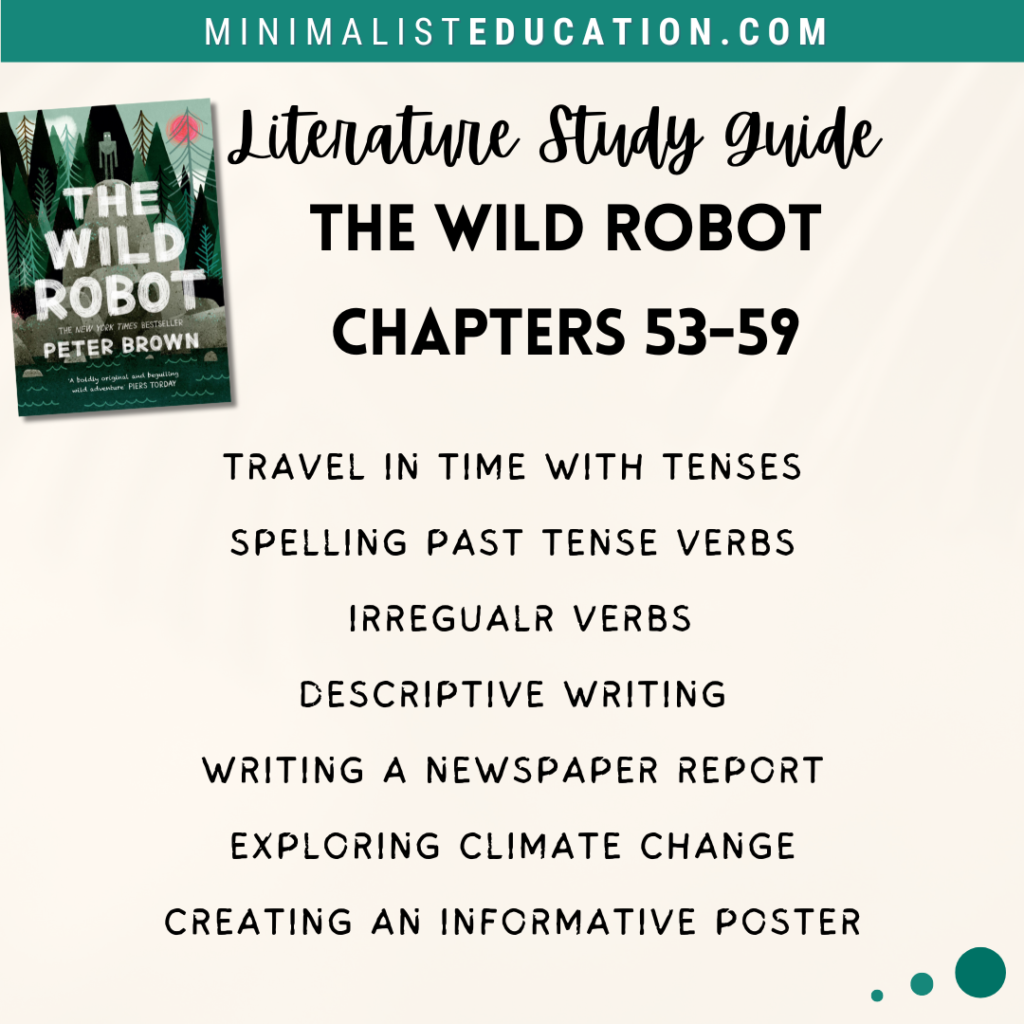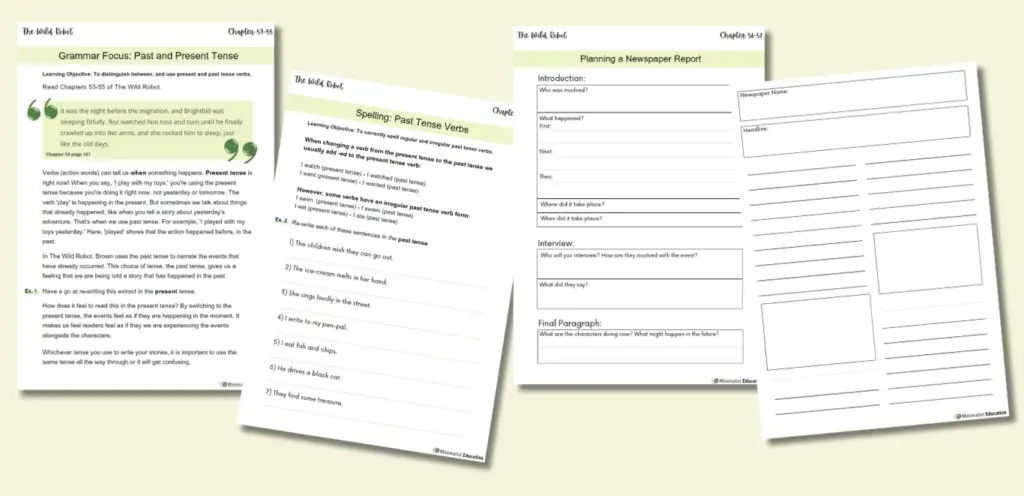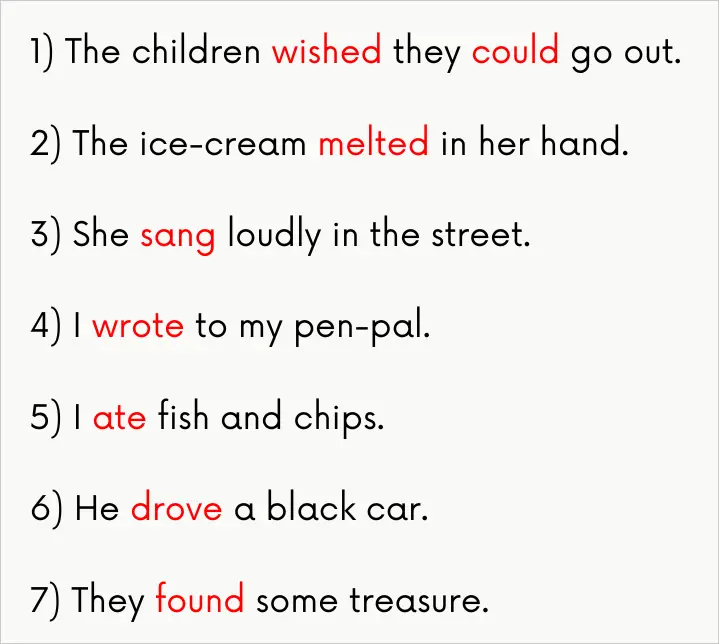Let’s Write a Newspaper Report! The Wild Robot Chapters 53-59 Study Guide
This post contains paid links. I may get a commission if you decide to make a purchase through my links, at no extra cost to you. Thank you for helping towards the cost of hosting and maintaining this website.

This week, in The Wild Robot, a very dramatic event occurs on the island and it makes for a perfect opportunity for kids to write a newspaper report based on the event. Included in this week’s study guide are handy tips for writing a newspaper report and newspaper report planning sheet, and a newspaper report template.
Kids will actually have an opportunity to do two extended writing projects, a newspaper report and an informative poster on Climate Change, plus a short descriptive writing task, all based on this week’s reading. If this is too much for your child, feel free to skip anything only do the writing activities that interests your child, or that target any skills that you want to focus on. Also in this week’s guide, we will be focusing on simple tenses.

Read my introduction and find all the links to The Wild Robot study guide here.
In this post:
- The Wild Robot teaching notes and answers for Week 10 Chapters 53-59.
- Download The Wild Robot Study Guide for Week 10 Chapters 53-59.
Get your copy of The Wild Robot
Buy a copy of “The Wild Robot” (Amazon Link).
Any purchase you make using the Amazon links on this site at no extra cost to you. Thank you for helping towards the cost of hosting and maintaining this website.
The Wild Robot Chapters 53-59 Study Guide Teaching Notes And Answers
Read Chapters 53-55:
- Read the grammar Focus notes on past and present tense
- Ex. 1 Have a go at re-writing the extract given in the present tense.
This week, we are going to start off by having a look at simple tenses, namely the past and present tense, which are crucial for helping children develop strong language skills.
Simple tenses refer to the basic forms of verb conjugation that indicate the time of a verb. They are essential building blocks in constructing clear and meaningful sentences.
There are three primary simple tenses: past, present, and future. Each tense serves a specific purpose in showing when an action occurred or will occur:
- Past Tense: This tense is used to describe actions or events that have already happened. For example, “She walked to the store yesterday.”
- Present Tense: Present tense verbs describe actions or states of being that are currently happening or are habitual. For instance, “He eats breakfast every morning.”
- Future Tense: Future tense verbs indicate actions or events that will occur at some point after the present moment. An example is, “They will go to the park tomorrow.”
Have your child re-write the extract in the present tense. When I did this task with the class, some of them found it more tricky than what I had anticipated, so to cement this skill further, I ended up using more sentences from different books for the kids to have plenty of practice switching between the past and present tense.

Once the extract has been written in the present tense, read it out and notice the difference in impact between having a story told in the present tense compared to the story being told in the past tense.
Remember, to stress the fact that it usually doesn’t matter whichever tense is used to write stories, however, it is important to use the same tense all the way through or it will get confusing.
Spelling: Past Tense Verbs
- Read the spelling notes on Past Tense Verbs
- Ex. 2 Re-write each of the sentences in the past tense.
Read through the notes on spelling past tense verbs and then do the exercise which focuses on spellings of past tense verbs, getting kids to practice correctly spelling regular and irregular past tense verbs.

Whilst most verbs are made into past tense from the present tense by adding -ed to the present tense verb :
I watch (present tense) – I watched (past tense).
I want (present tense) – I wanted (past tense).
Some verbs have an irregular past tense verb form:
I swim (present tense) – I swam (past tense)
I eat (present tense) – I ate (past tense)
Writing Activity: Painting a Picture With Words
- Read the winter related sentences taken from The Wild Robot.
- Read the notes on Brown’s use of winter-related vocabulary to vividly describe a winter scene.
- Ex. 3 Find a picture of a winter scene and write a paragraph describing it.
We will be focusing on how Brown has crafted his description using winter related vocabulary giving children the opportunity to expand their vocabulary words and phrases associated with winter.
In this chapter, Brown uses winter-specific terms like “snowflakes,” “ice,” and referencing the cold weather sweeping down from the north firmly establishes the season. The use of words like “quiet,” “grey,” “sheet of ice,” “pure white,” and “devastating cold front” set a tone of stillness, coldness, and the transformative nature of winter, enhancing the mood of the scene.
The exercise asks children to find a picture of a winter scene and write a paragraph describing it. Get them to describe not only what they can see, but to also include what they might feel, and hear if they were in this scene.
This is an ideal task to incorporate everything we have learnt about great writing in the previous weeks of this guide. Remind your kids to include lots of adjective, powerful verbs, and adverbs to really paint a picture with their words.
I’ve also included some winter words they can refer to and include if they want.
Writing a Newspaper Report!
Chapters 56-57
- Read chapters 56- 57 of “The Wild Robot”.
- Write a newspaper report about the fire which happened in Chapter 57.
In chapter 57 in “The Wild Robot” the lodgers face a perilous situation as fire engulfs one of the lodges. Your kids are going to write a newspaper article based on this dramatic event.
Before Writing the Newspaper Report
Before your child begins this writing task, discuss key questions with your children such as:
- What caused the fire?
- How did Roz and other characters respond to the emergency?
- Were there any casualties or heroic acts?
- What are the implications of this event for the animals?
Children can use the Newspaper Report Planning Prompts sheet first to help them plan their newspaper report, before using Newspaper Report Template to write their final article.
Features of a Newspaper Report
It will definitely help to have a look through through some newspaper articles to identify how that genre is written. You can use the following features of a newspaper report checklist to point out some writing features that are unique to newspaper articles:
Headlines:
- The headline sums up the story in a few words
- Headlines use powerful and interesting language
- Puns or alliterations are often used
- Headlines are written in the present tense – even if the event has already happened
For a good lead paragraph, you need to;
- The lead paragraph answers as most of these six questions – Who? What? Where? Why? When? How?
- The past tense is used in most cases
- It is very short
The rest of the report:
- More information and detail is given
- Background information, evidence, facts and quotes from people involved in or connected to the event/story are also included
Exploring Climate Change
Chapters 58-59
Read chapters 58- 59 of “The Wild Robot”.
- Read the notes on climate change
- Ex. 1 Create a poster on climate change. Include information about what causes it, what its effects are, and what we can do to help the environment.
In Chapter 58 of “The Wild Robot” Crag the turtle describes significant changes occurring in the weather and environment: colder winters, hotter summers, fiercer storms, and rising sea levels.
Whilst “The Wild Robot” is set about 100 years from now, so the changes are more severe than what we are currently experiencing, these changes vividly illustrate the real-world impacts of climate change on our planet.
This chapter provides a perfect opportunity to learn a bit more about this critical topical subject.
Climate change refers to long-term shifts in temperature, weather patterns, and environmental conditions that are largely caused by human activities, such as burning fossil fuels and deforestation.
The notes in the study guide provide a basic introduction to climate change. Definitely do some extra research about this topic, and then get your kids to create a poster on it.
Download Your Copy of The Wild Robot Study Guide for Chapters 53-59:
I hope this has helped some of you out!